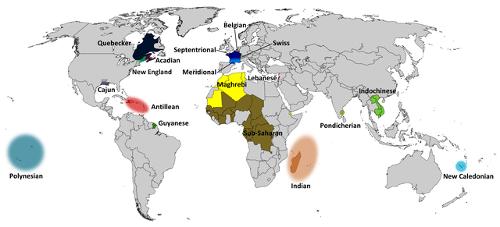PROVENCE
Language

Language
Popular destinations FRANCE
| Alsace | Ardeche | Auvergne |
| Brittany | Burgundy | Cevennes |
| Corsica | Cote d'azur | Dordogne |
| Jura | Languedoc-roussillon | Loire valley |
| Lot | Normandy | Picardy |
| Provence |
Language
The official language is, of course, French, but Occitan is the indigenous language of Provence, and Provençal is a variant of it, as is Languedocian.
Occitan is descended from Indo-Germanic and developed from Latin, which was imported by the Romans. After the fall of the Roman Empire, Latin split into several other languages. In the north of France, the langue d'Oïl developed and in the south the langue d'Oc, the language of government and culture. Occitan includes several variants that are very similar, which is why most people in Provence who speak Occitan can understand each other well.
In the 15th century, Occitan mixed with Catalan and the Povençal dialect began to be distinguished from Languedocian from the end of the 15th century. This happened after the incorporation of Provence into the French kingdom. Provençal Occitan was therefore more influenced by French than the other dialects.
In the 19th century, Occitan flourished again due to the rejection of total monarchy and the revival of agricultural society. Until the beginning of the 20th century, Occitan was widely spoken both in the cities and in the countryside. In the first half of the 20th century, Occitan was greatly reduced, but in the 1950s it experienced a strong revival. Occitan is now even taught in schools and universities again, thanks in part to organisations such as the Institut d'Études Occitanes in Montpellier. In 2003, the regional government of Provence-Alpes-Côtes-d'Azur recognised the Provençal language and was going to work even harder for more education in this language.
In total, about one third of the French population still speaks some kind of Occitan dialect. The language area extends from the Mediterranean to approximately the Bordeaux-Vichy-St. Étienne-Briançon line, and Occitan is therefore a medium-sized European language.
| some words in Occitan | ||
| English | French | Occitan |
| abyss | gouffre | aven |
| detached house | domaine isolée | mas |
| source | résurgance | foux |
| valley without river | vallée sèche | combe |
| deep canyon | gorge | canyon |
| cave | grotte | baume |
| hill | coteau | costière |
| height | butte | pech |
The French language is a Roman language spoken by approximately 100 million people as their mother tongue, of which approximately 60 million in France. French is further spoken in Belgium down the line Visé-Mouscron and Brussels, in Switzerland (Suisse romande), Italy (Aosta Valley), Haiti and Canada (Quebec), and in many former French colonies. Where Frenche is the language of administration and administration French is a continuation of the Vulgar Latin, which was introduced and developed in Gallia Transalpina by the Roman conquerors (58–50 BC). Dialects of the French language worldwidePhoto: Jonatan argento CC 3.0 Unported no changes made
Dialects of the French language worldwidePhoto: Jonatan argento CC 3.0 Unported no changes made
The history of French begins when the Carolingian Renaissance, which revived the study of Classical Latin, made people aware of a gap between Latin, language of administration, jurisdiction and religion, and everyday language. This is evidenced, among other things, by a decision of the Council of Tours (813), which henceforth had to be preached in the vernacular ("lingua romana rustica"). Broadly speaking, three periods can be distinguished in the history of French: Old French (early 9th - early 14th century), Middle French (early 14th - early 17th century) and modern French (early 17th century - present). 4 volume French dictionary (1889)Photo: LPLT / Wikimedia Commons CC 3.0 Unported no changes made
4 volume French dictionary (1889)Photo: LPLT / Wikimedia Commons CC 3.0 Unported no changes made
The French language originally consisted of Latin words introduced by the Romans, supplemented by words of Celtic and Frankish origin. From the 12th century onwards, these "folk words" are borrowed from Latin, the "learned" words. In the 16th century, many words were also borrowed from Italian. Many words have also been borrowed from Dutch and, since the 18th century, also from English.
Especially in recent decades, much has been borrowed from English in the field of technology, sports, fashion, and the like, which has resulted in the derisive term Franglais. French purists oppose this "invasion" of foreign words.
Sources
Blisse, M. / Provence
Lannoo
Eck, N. van / Provence, Côte d’Azur
Gottmer/Becht
Guérin, R. / Provence
Van Reemst
Jardinaud, M. / Provence
ANWB
Provence
Lannoo,
Williams, R. / Provence & Côte d’Azur
Van Reemst
Zwijnenburg, H. / Provence, Côte d’Azur
ANWB
CIA - World Factbook
BBC - Country Profiles
Copyright: Team The World of Info